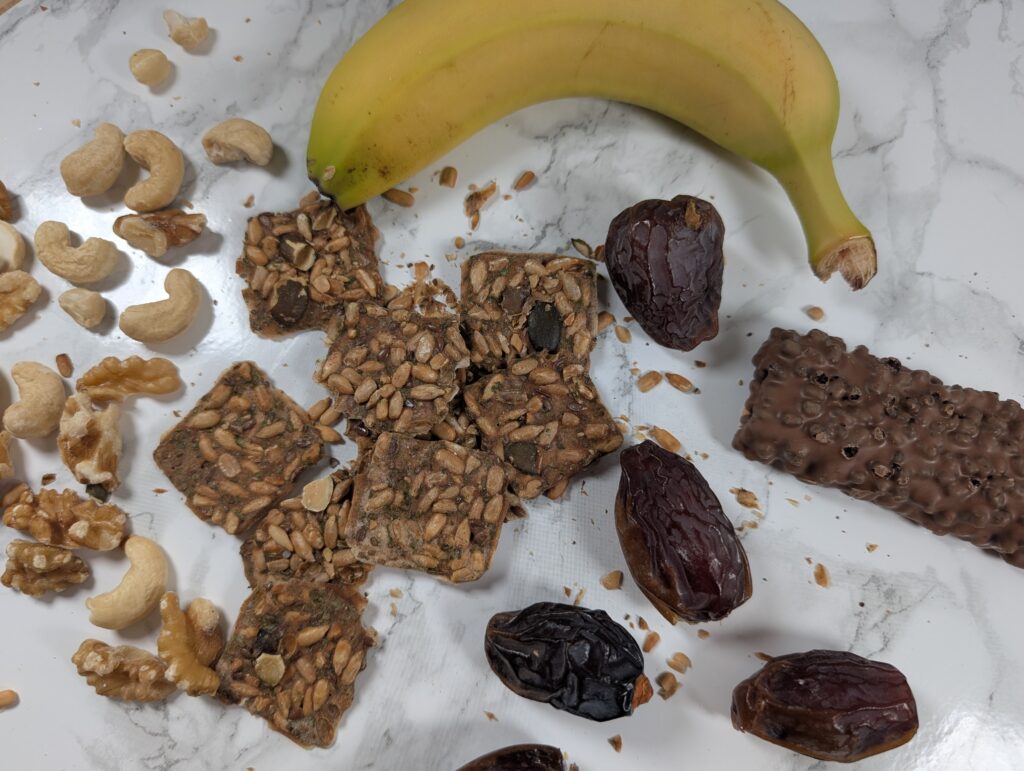Bikepacking & Nutrition: How to smartly supply yourself on tour
An interview with nutritionist Tamara Wüthrich
Whether it's an energy slump, digestive problems, or cravings – anyone who spends several days cycling knows the challenge: How do I optimally nourish my body without a lot of cooking or fresh food? We spoke with Swiss nutritionist Tamara Wüthrich. In the interview, she reveals why regular energy intake is so important, how you can avoid digestive problems – and why emotional eating is completely okay while traveling. The topic was discussed in the blog "Beginners guide” already touched upon – here we go into more detail.
Tamara Wüthrich is a trained nutritionist and specializes in holistic well-being. On Instagram, she is known as @vitaemin_taemi She's on the go, sharing practical tips on nutrition, mindfulness, and tolerance. Her philosophy: nutrition should work, but also be enjoyable – and adapt to life, not the other way around. We asked her how she manages this on longer bike rides.

“For me, eating well means balanced, suitable for everyday life and conscious.”
Tamara, you work with a focus on holistic well-being. What does "eating well" mean to you – especially in a busy everyday life?
For me, eating well means eating a varied and balanced diet – with complex carbohydrates, proteins, and fats. On days with a lot of exercise, I rely on quickly available carbohydrates and then a combination of Carbohydrates and proteins to support recovery.
What motivates you to look at nutrition not only functionally but also emotionally?
Because nutrition is very individual. What works for one person might not be right for another. I find it exciting to work with my clients to find out what works for them personally. Nutrition isn't a mass product—it has to fit into their lives.
Bikepacking & Nutrition: “Hunger is stressful – and that also affects your mental strength.”
Bikepacking is physically demanding—but also mentally. How can nutrition help you stay steadied?
Our blood sugar levels directly affect our mood. If we eat too little, our body produces stress hormones like cortisol – and this can make us mentally unstable. That's why it's extremely important to regularly consume small portions of carbohydrates while on the go. Starving yourself is counterproductive – physically and mentally.
Many people eat too much or too little while on the go – how do you get back into balance?
Acceptance is the first step. If you've eaten too little, you can quickly counteract it with small snacks like bars or dried fruit. If you've eaten too much, only patience will help – and slowing down. Digestion under full load is inhibited.
“Mindful eating is also possible on tour – with small rituals.”
You talk a lot about mindful eating. How does that work on the go when you're tired or hungry?
Even on tour, take time to eat. A quick check-in—what are you tasting? How are you feeling?—can help. Even if you're very hungry, try to eat slowly. A rule of thumb: Chew each bite 30 times. And—very practical—it's better to eat cold leftovers from dinner for lunch than to prepare something hot under time pressure.
“Well chewed is half digested – especially during physical exertion.”
Many people complain of digestive problems while traveling. What are the most common causes?
Often it is hasty, careless eating. Digestion begins in the mouth – chewing already begins the first step of digestion. If this is missing, the intestines have more trouble. This is especially important during physical exertion, because your body can't concentrate on digestion and driving at the same time.
What do you recommend to ensure your body is well nourished while on the go, but not overtaxed?
Quickly available carbohydrates are useful during the day – for example whiter Rice, pasta, white bread, dried fruit. In the evening, eat fiber-rich, nutrient-dense foods – e.g., lentils, vegetables, Whole grain bread combined with healthy fats and proteins. And above all: listen to your own hunger.
“Quick energy is good – but only at the right moment.”
Many people resort to sugar or bars. When does this make sense, and when not?
After 60–90 minutes of exercise, the The body's muscle glycogen stores are running low. Then it's a good idea to reload with carbohydrates – perhaps with a bar or dried fruit. But be careful with too much fructose at once – it can overwhelm your intestines. It's best to test beforehand what you tolerate well.
“Emotional eating is okay – as long as it makes you feel good.”
What do you think about comfort or reward eating on tour?
Emotional eating isn't inherently bad. Only when it's associated with distress is it worth examining the underlying habit—perhaps with professional support. Eating is more than just consuming nutrients.
And finally: What are your personal bikepacking essentials?
I love my homemade crackers and dates—I always have them with me. When it's cold, I make polenta in a thermos in the morning—it stays warm for a long time! I also add a few hard-boiled eggs for protein. For me, warm food on the go is simply comfort food.
More from Tamara Wüthrich
Want to learn more about Tamara, her recipes, or consultations? Then check out:
